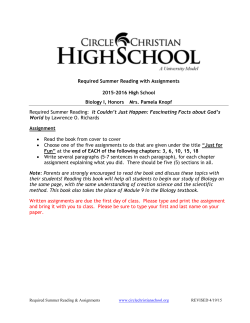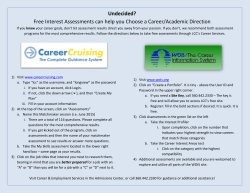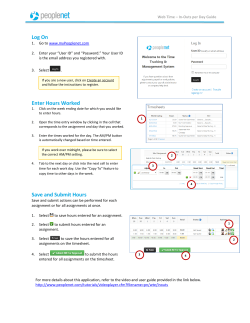
World History and Geography - Ms Makarechian`s Student Site
Advanced Placement World History (APWH) Course Syllabus 2015-2016 Ms. Makarechian sarah.makarechian@adams12.org 720-972-2672 Course Description: Welcome to Advanced Placement (AP) World History! Advanced Placement World History is designed to provide students with the knowledge and skills that will facilitate their understanding of the evolution of global processes through the study of interaction among different societies. Focuses include encounters and interactions among the major societies and how their actions (political, economic, technological, and environmental) have both initiated change and allow for continuities over time, from 8000 BCE to the present. The curriculum—in terms of both content and skills—for this course is based on the five major themes and “habits of mind” specified by the College Board. Course Website and Remind 101: My course website can be accessed at http://msmakarechian.weebly.com Students will be able to access relevant class information including a calendar, assignments, etc. Students will also join Remind101— an educational tool that allows teachers to send text message reminders about homework, tests, etc. Remind101 is safe and private— neither students nor teachers see phone numbers. Standards: The following Colorado Model Content Standards are addressed in this course: 1. Students understand the chronological organization of history and know how to organize events and people into major eras to identify and explain historical relationships. 2. Students know how to use the processes and resources of historical inquiry. 3. Students understand that societies are diverse and have changed over time. 4. Students understand how science, technology, and economic activity have developed, changed, and affected societies throughout history. 5. Students understand political institutions and theories that have developed and changed over time. 6. Students know that religious and philosophical ideas have been powerful forces throughout history. Course Requirements AP World History is open to all students who desire a rigorous, challenging, college-preparatory course. All students enrolled in the course must take the AP World History Exam in May. Main Textbook Strayer, Robert W. Ways of the World: A Brief Global History with Sources. Boston: Bedford/St. Martin’s, 2010. Student resources for textbook available at http://bedfordstmartins.com/strayer Course Outline: Unit I: 8000 BCE – 600 BCE: Neolithic Revolution and the Beginning of Civilization Key Concepts: Technological and Environmental Transformations Big Geography and the Peopling of the Earth Neolithic Revolution and Early Agricultural Societies Development and Interactions of Early Agricultural, Pastoral, and Urban Societies 5 weeks Unit II: 600 BCE to 600 CE: The Ancient and Classical Worlds Key Concepts: Organization and Reorganization of Human Societies Development and Codification of Religious and Cultural Traditions Development of States and Empires Emergence of Transregional Networks of Communication and Exchange 6 weeks Unit III: 600-1450: The Postclassical World Key Concepts: Regional and Transregional Interactions Expansion and Intensification of Communication and Exchange Networks Continuity and Innovation of State Forms and Their Interactions Increased Economic Productive Capacity and Its Consequences 5 weeks 1 Unit IV: 1450-1750: The Global Age of Exploration and Expansion Key Concepts: Global Interactions Globalizing Networks of Communication and Exchange New Forms of Social Organization and Modes of Production State Consolidation and Imperial Expansion 5 weeks Unit V: 1750-1900: The World in Revolution and Change Key Concepts: Industrialization and Global Integration Industrialization and Global Capitalism Imperialism and Nation-State Formation Nationalism, Revolution and Reform Global Migration 5 weeks Unit VI: 1900-Present: The Modern Age: Pain, Progress, and Promise Key Concepts: Accelerating Global Change and Realignments Science and the Environment Global Conflicts and Their Consequences New Conceptualizations of Global Economy and Culture 5 weeks Class Rules: 1. Bring your APWH notebook AND textbook to class EVERY DAY. 2. Be on time and ready to work when the bell rings. 3. Respect diversity: name-calling, racism, sexism, homophobia, or any other displays of intolerance will not be tolerated. 4. Be prepared to do your best in class each day. 5. Show respect for yourself, each other, the teacher, and the classroom. Consequences for violating the rules include owing time, behavior contracts, parent conferences, and referral to student relations. Class Policies: 1. APWH Class Notebook The APWH notebook will be used for all class notes, handouts, class work, projects, and homework assignments, etc. in AP World History. It will enable you not only to keep track of all your materials for AP world History, but to process information in a creative, independent way. It is required that you have the notebook with you everyday in class along with other materials and your textbook. You will be given specific guidelines for organizing your notebook in class. *You will be very relieved to have kept a notebook all year, when the time comes to begin reviewing for the AP Exam. 2. Attendance/Absences/Make-Up Work: Your presence in class is essential. If you MUST miss class due to illness or other circumstances beyond your control, it is YOUR RESPONSIBILITY to find out which assignments you missed, to get the handouts, and to borrow and copy the class notes for the day(s) you were absent. You can find out what you missed on the course website. It is the responsibility of the student or parent to request and arrange to obtain make-up work no later than the second school day after returning to class or school from the absence. Students shall be given at least the same number of days they were absent plus one additional day to make up assignments. The makeup period begins on the next school day following the absence(s). Students are eligible to receive full credit for make-up work completed and submitted by dates and times established in this policy. Credit may be reduced for in-class or group activities missed, such as labs, presentations, or assessments which are not readily able to be completed with comparable make-up assignments and/or without the validity of the assignment being compromised. 4. Late Work Policy: Late work is better than no work at all. I will take 10% off each day an assignment is turned in late, for a minimum of half credit for the assignment. If you do not understand an assignment, come and see me for help BEFORE it is due. 5. Food and Drink: Only non-distracting food and drinks are allowed. You will not be provided hall passes to purchase food and drink—get these before you come to class. I determine when a food or drink is a distraction—in that case it will be held for you at my desk until the end of class. 6. Tardiness: It is your responsibility to come to class on time. If you are tardy, do not expect me to fill you in on what you missed or allow you to make up any activities missed due to tardiness. 7. Leaving class: You are allowed to leave class only with a pass provided by me. Trips to the restroom and water fountain should be made before coming to class. 8. Cellphones, IPods, etc.: Turn them off and put them away, or I will keep them for you until the end of class. At times you will be allowed to listen to your ipod during class. I will let you know when this is appropriate. 2 9. Plagiarism/Cheating: I begin the year with complete trust and faith in each of you. Please do not lower yourself in my eyes or, more importantly, in your own, by cheating or being dishonest in any way. Plagiarism will result in a zero for the assignment. 10. Accomodations: I encourage students with specific learning needs to discuss with me, during my office hours, appropriate accommodations that might be helpful to them. Please know that I will use information from IEPs, 504 Plans, or LAU assessments to differentiate instruction appropriately. Grading Policy/Assessment Grades are based on essays, seminars, student projects and tests. Assessments and grading standards are applied consistently to students of similarly demonstrated ability. Grading Scale Grade Percentages/Weights A 90-100 Summative Assessments & Projects 80% B 80-89 Formative Assessments & Projects 20% C 70-79 *Weekly progress grades are posted at D 60-69 https://ic.adams12.org/campus/portal/adams12.isp F 59 or below For most major assignments, I will provide the rubrics or explain the expectations that I will use to assess your work. For general reference, however, here are some thoughts on my expectations for assignments: General Expectations Grades are based upon the demonstration of proficiency on units associated with a standard given during each formative or summative assessment. Formative grades in addition to summative unit assessments will be used to holistically determine your grade. Summative: 80% Summative measures of achievement are taken when unit master is expected. (i.e., unit tests, culmination of a project, embedded assessments, etc.) Formative: 20% Formative assessments measure the scaffolding skills and/or content embedded in the unit. Formative assessments are taken frequently, after a student has practiced a skill or become familiar with content. Examples of formative assessments include but are not limited to exit tickets, paragraphs, oral check for understanding, warm-ups, stages in a large project, etc. Assessments will be graded based on teacher/district/state rubrics. On group projects, students will receive a grade for individual work and a group grade. Grades are based on achievement of Content Standards and Grade Level Expectations. If a student receives an F grade in the class, the weighted GPA given for taking AP classes will not be awarded. Extra Credit: While extra credit does not replace effort on required assignments, I do believe extra work, at times, merits extra points. There will be occasional opportunities for extra credit points. How to succeed in this class Reading There is NO substitute for reading. All studies show that truly talented and gifted students read and read well. And the one single ingredient to remedy low grades and low performance is to read. You will have a small amount of reading almost every night, and you are expected to take notes on what you read. Be prepared to THINK! Remember, although we are in high school, this is a course for which you may earn college credit. We will discuss topics that may be new and different. Please keep an open mind. You do not have to agree with what you read and hear, but you will need to think historically. Don’t freak out Do not worry about your grade unless it is a D or an F. This is a college course and universities know the difference on transcripts between regular and Advanced Placement classes. University Admissions will tell you they would rather see a “C” in an AP than an “A” in a regulars’ class. AP classes earn higher grade points. Consequently an 87 in an AP class is worth a 97 in a regular class. And if your grade still bothers you, there is always extra credit and more thorough study. Practice, practice, practice You will be learning new skills in writing and analysis. These skills will help you in all your future academic endeavors. Do all of your assigned work to the best of your ability. Take feedback and learn from your mistakes. Complete all writing assignments About ½ of your grade is writing, you must be able to write if you want to pass. Come in for extra help I am here before school, after school, and at lunch for help. 3
© Copyright 2025










